Human Resource Management in the Banking Sector in Australia
VerifiedAdded on 2022/11/26
|13
|4219
|223
AI Summary
This article discusses the human resource management issues faced by managers in the banking sector in Australia, including regulatory challenges, pension reforms, and diversity challenges. It also explores the challenges faced by the banking industry in Australia, such as structural challenges and increased scrutiny. The article further examines the Royal Commission into Misconduct in the Banking, Superannuation, and Financial Services Industry, the federal government and opposition's response to the recommendations, and the banking industry's response. Recommendations for employment in the banking industry are also provided.
Contribute Materials
Your contribution can guide someone’s learning journey. Share your
documents today.
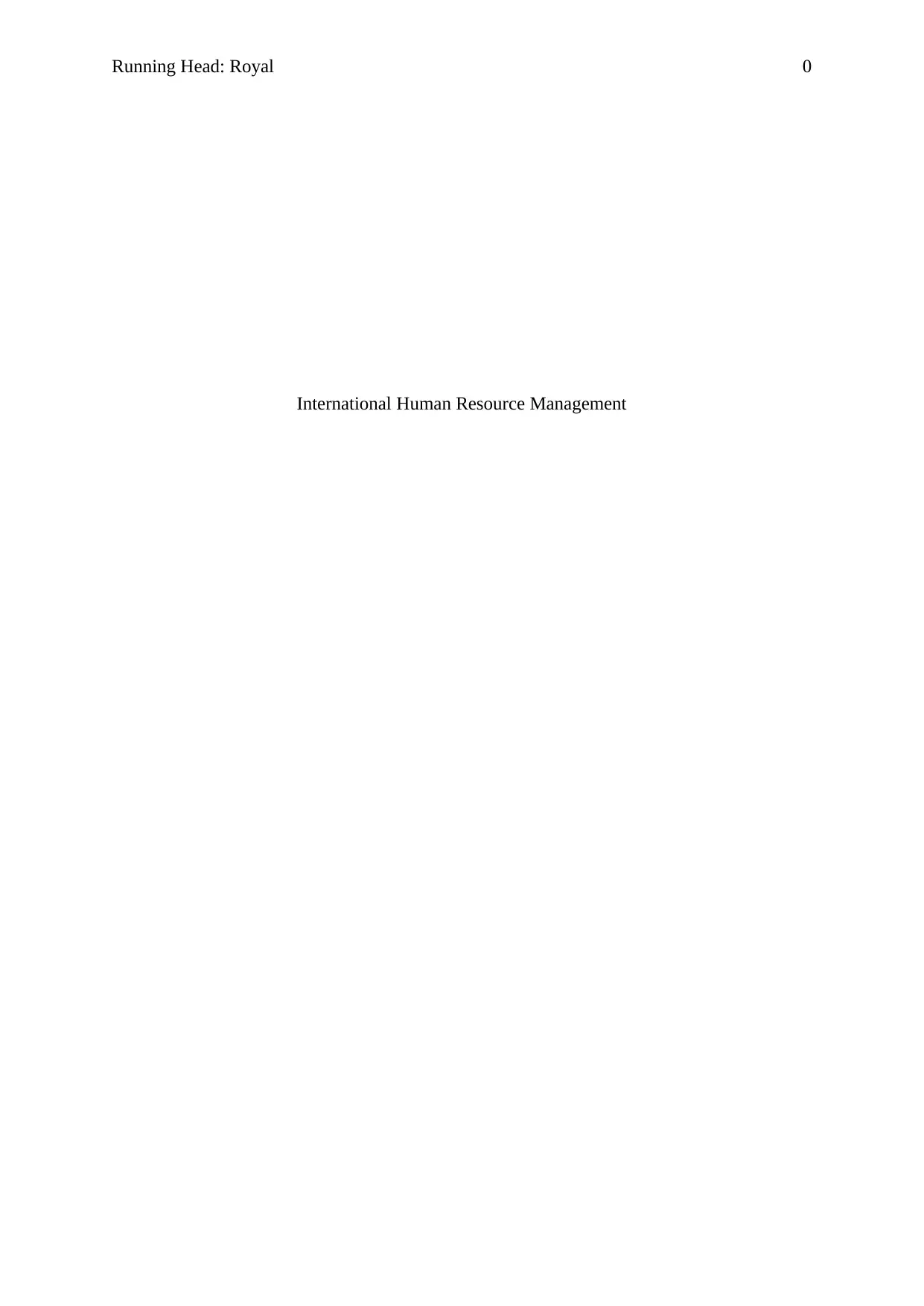
Running Head: Royal 0
International Human Resource Management
International Human Resource Management
Secure Best Marks with AI Grader
Need help grading? Try our AI Grader for instant feedback on your assignments.
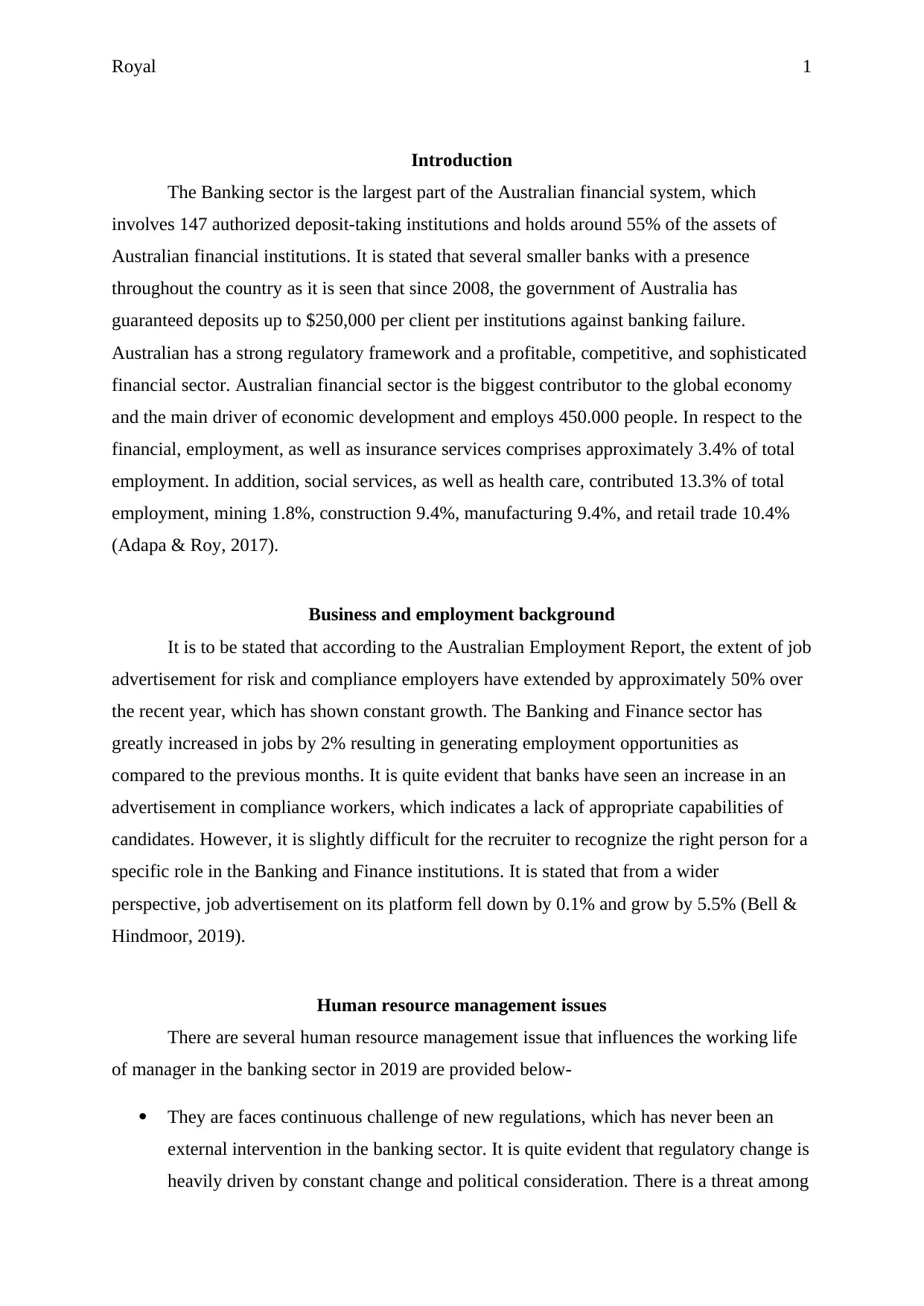
Royal 1
Introduction
The Banking sector is the largest part of the Australian financial system, which
involves 147 authorized deposit-taking institutions and holds around 55% of the assets of
Australian financial institutions. It is stated that several smaller banks with a presence
throughout the country as it is seen that since 2008, the government of Australia has
guaranteed deposits up to $250,000 per client per institutions against banking failure.
Australian has a strong regulatory framework and a profitable, competitive, and sophisticated
financial sector. Australian financial sector is the biggest contributor to the global economy
and the main driver of economic development and employs 450.000 people. In respect to the
financial, employment, as well as insurance services comprises approximately 3.4% of total
employment. In addition, social services, as well as health care, contributed 13.3% of total
employment, mining 1.8%, construction 9.4%, manufacturing 9.4%, and retail trade 10.4%
(Adapa & Roy, 2017).
Business and employment background
It is to be stated that according to the Australian Employment Report, the extent of job
advertisement for risk and compliance employers have extended by approximately 50% over
the recent year, which has shown constant growth. The Banking and Finance sector has
greatly increased in jobs by 2% resulting in generating employment opportunities as
compared to the previous months. It is quite evident that banks have seen an increase in an
advertisement in compliance workers, which indicates a lack of appropriate capabilities of
candidates. However, it is slightly difficult for the recruiter to recognize the right person for a
specific role in the Banking and Finance institutions. It is stated that from a wider
perspective, job advertisement on its platform fell down by 0.1% and grow by 5.5% (Bell &
Hindmoor, 2019).
Human resource management issues
There are several human resource management issue that influences the working life
of manager in the banking sector in 2019 are provided below-
They are faces continuous challenge of new regulations, which has never been an
external intervention in the banking sector. It is quite evident that regulatory change is
heavily driven by constant change and political consideration. There is a threat among
Introduction
The Banking sector is the largest part of the Australian financial system, which
involves 147 authorized deposit-taking institutions and holds around 55% of the assets of
Australian financial institutions. It is stated that several smaller banks with a presence
throughout the country as it is seen that since 2008, the government of Australia has
guaranteed deposits up to $250,000 per client per institutions against banking failure.
Australian has a strong regulatory framework and a profitable, competitive, and sophisticated
financial sector. Australian financial sector is the biggest contributor to the global economy
and the main driver of economic development and employs 450.000 people. In respect to the
financial, employment, as well as insurance services comprises approximately 3.4% of total
employment. In addition, social services, as well as health care, contributed 13.3% of total
employment, mining 1.8%, construction 9.4%, manufacturing 9.4%, and retail trade 10.4%
(Adapa & Roy, 2017).
Business and employment background
It is to be stated that according to the Australian Employment Report, the extent of job
advertisement for risk and compliance employers have extended by approximately 50% over
the recent year, which has shown constant growth. The Banking and Finance sector has
greatly increased in jobs by 2% resulting in generating employment opportunities as
compared to the previous months. It is quite evident that banks have seen an increase in an
advertisement in compliance workers, which indicates a lack of appropriate capabilities of
candidates. However, it is slightly difficult for the recruiter to recognize the right person for a
specific role in the Banking and Finance institutions. It is stated that from a wider
perspective, job advertisement on its platform fell down by 0.1% and grow by 5.5% (Bell &
Hindmoor, 2019).
Human resource management issues
There are several human resource management issue that influences the working life
of manager in the banking sector in 2019 are provided below-
They are faces continuous challenge of new regulations, which has never been an
external intervention in the banking sector. It is quite evident that regulatory change is
heavily driven by constant change and political consideration. There is a threat among
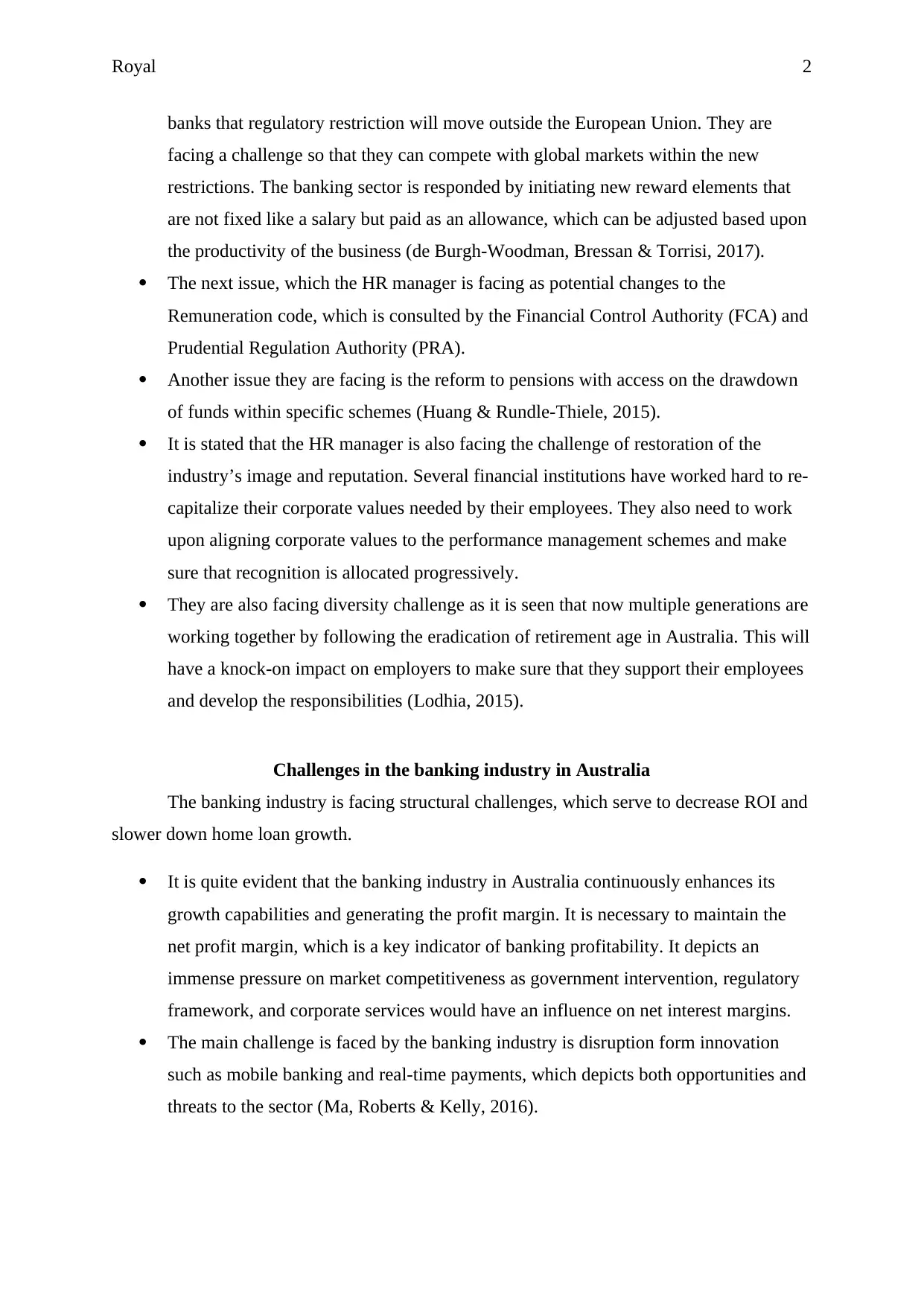
Royal 2
banks that regulatory restriction will move outside the European Union. They are
facing a challenge so that they can compete with global markets within the new
restrictions. The banking sector is responded by initiating new reward elements that
are not fixed like a salary but paid as an allowance, which can be adjusted based upon
the productivity of the business (de Burgh-Woodman, Bressan & Torrisi, 2017).
The next issue, which the HR manager is facing as potential changes to the
Remuneration code, which is consulted by the Financial Control Authority (FCA) and
Prudential Regulation Authority (PRA).
Another issue they are facing is the reform to pensions with access on the drawdown
of funds within specific schemes (Huang & Rundle-Thiele, 2015).
It is stated that the HR manager is also facing the challenge of restoration of the
industry’s image and reputation. Several financial institutions have worked hard to re-
capitalize their corporate values needed by their employees. They also need to work
upon aligning corporate values to the performance management schemes and make
sure that recognition is allocated progressively.
They are also facing diversity challenge as it is seen that now multiple generations are
working together by following the eradication of retirement age in Australia. This will
have a knock-on impact on employers to make sure that they support their employees
and develop the responsibilities (Lodhia, 2015).
Challenges in the banking industry in Australia
The banking industry is facing structural challenges, which serve to decrease ROI and
slower down home loan growth.
It is quite evident that the banking industry in Australia continuously enhances its
growth capabilities and generating the profit margin. It is necessary to maintain the
net profit margin, which is a key indicator of banking profitability. It depicts an
immense pressure on market competitiveness as government intervention, regulatory
framework, and corporate services would have an influence on net interest margins.
The main challenge is faced by the banking industry is disruption form innovation
such as mobile banking and real-time payments, which depicts both opportunities and
threats to the sector (Ma, Roberts & Kelly, 2016).
banks that regulatory restriction will move outside the European Union. They are
facing a challenge so that they can compete with global markets within the new
restrictions. The banking sector is responded by initiating new reward elements that
are not fixed like a salary but paid as an allowance, which can be adjusted based upon
the productivity of the business (de Burgh-Woodman, Bressan & Torrisi, 2017).
The next issue, which the HR manager is facing as potential changes to the
Remuneration code, which is consulted by the Financial Control Authority (FCA) and
Prudential Regulation Authority (PRA).
Another issue they are facing is the reform to pensions with access on the drawdown
of funds within specific schemes (Huang & Rundle-Thiele, 2015).
It is stated that the HR manager is also facing the challenge of restoration of the
industry’s image and reputation. Several financial institutions have worked hard to re-
capitalize their corporate values needed by their employees. They also need to work
upon aligning corporate values to the performance management schemes and make
sure that recognition is allocated progressively.
They are also facing diversity challenge as it is seen that now multiple generations are
working together by following the eradication of retirement age in Australia. This will
have a knock-on impact on employers to make sure that they support their employees
and develop the responsibilities (Lodhia, 2015).
Challenges in the banking industry in Australia
The banking industry is facing structural challenges, which serve to decrease ROI and
slower down home loan growth.
It is quite evident that the banking industry in Australia continuously enhances its
growth capabilities and generating the profit margin. It is necessary to maintain the
net profit margin, which is a key indicator of banking profitability. It depicts an
immense pressure on market competitiveness as government intervention, regulatory
framework, and corporate services would have an influence on net interest margins.
The main challenge is faced by the banking industry is disruption form innovation
such as mobile banking and real-time payments, which depicts both opportunities and
threats to the sector (Ma, Roberts & Kelly, 2016).
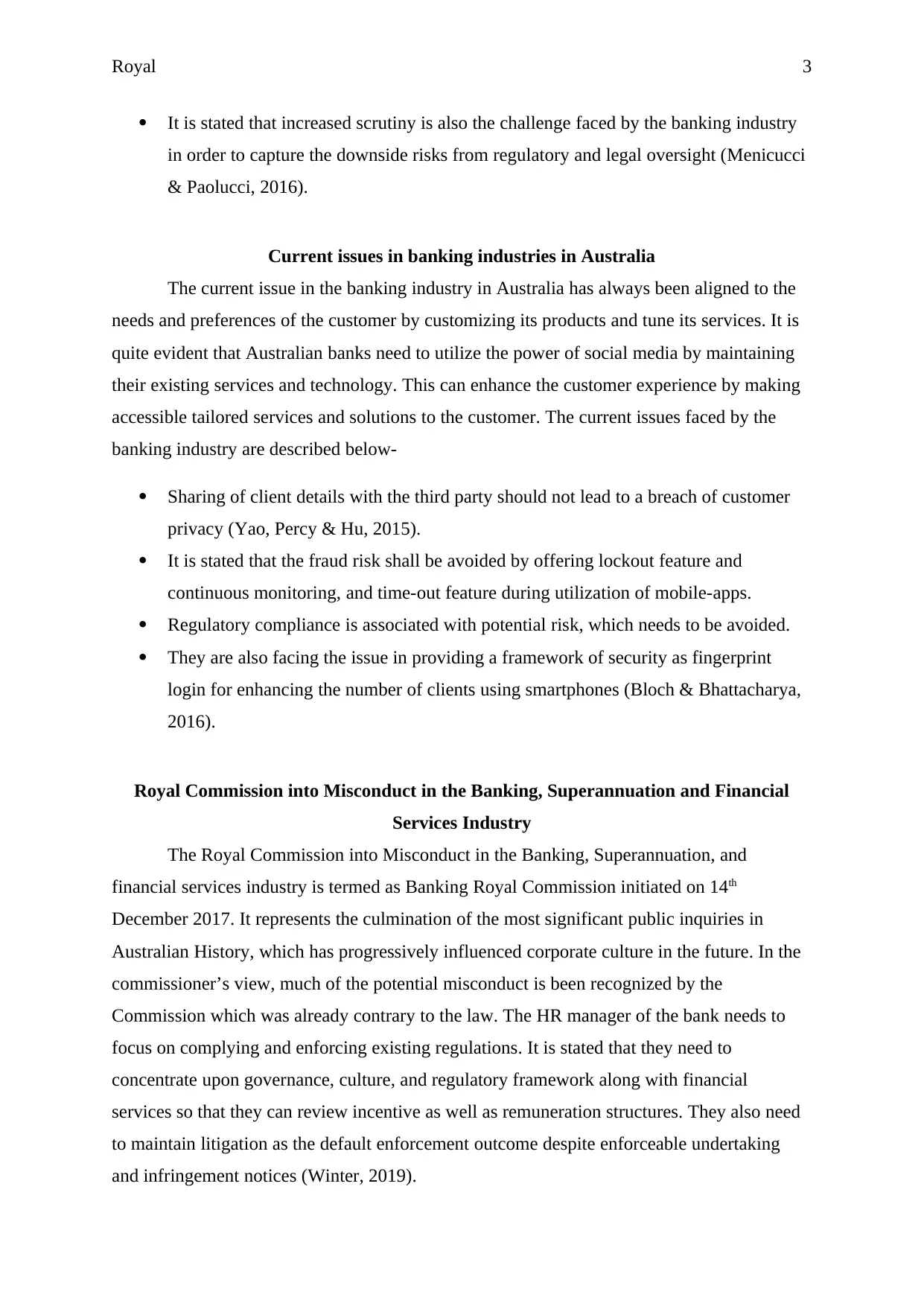
Royal 3
It is stated that increased scrutiny is also the challenge faced by the banking industry
in order to capture the downside risks from regulatory and legal oversight (Menicucci
& Paolucci, 2016).
Current issues in banking industries in Australia
The current issue in the banking industry in Australia has always been aligned to the
needs and preferences of the customer by customizing its products and tune its services. It is
quite evident that Australian banks need to utilize the power of social media by maintaining
their existing services and technology. This can enhance the customer experience by making
accessible tailored services and solutions to the customer. The current issues faced by the
banking industry are described below-
Sharing of client details with the third party should not lead to a breach of customer
privacy (Yao, Percy & Hu, 2015).
It is stated that the fraud risk shall be avoided by offering lockout feature and
continuous monitoring, and time-out feature during utilization of mobile-apps.
Regulatory compliance is associated with potential risk, which needs to be avoided.
They are also facing the issue in providing a framework of security as fingerprint
login for enhancing the number of clients using smartphones (Bloch & Bhattacharya,
2016).
Royal Commission into Misconduct in the Banking, Superannuation and Financial
Services Industry
The Royal Commission into Misconduct in the Banking, Superannuation, and
financial services industry is termed as Banking Royal Commission initiated on 14th
December 2017. It represents the culmination of the most significant public inquiries in
Australian History, which has progressively influenced corporate culture in the future. In the
commissioner’s view, much of the potential misconduct is been recognized by the
Commission which was already contrary to the law. The HR manager of the bank needs to
focus on complying and enforcing existing regulations. It is stated that they need to
concentrate upon governance, culture, and regulatory framework along with financial
services so that they can review incentive as well as remuneration structures. They also need
to maintain litigation as the default enforcement outcome despite enforceable undertaking
and infringement notices (Winter, 2019).
It is stated that increased scrutiny is also the challenge faced by the banking industry
in order to capture the downside risks from regulatory and legal oversight (Menicucci
& Paolucci, 2016).
Current issues in banking industries in Australia
The current issue in the banking industry in Australia has always been aligned to the
needs and preferences of the customer by customizing its products and tune its services. It is
quite evident that Australian banks need to utilize the power of social media by maintaining
their existing services and technology. This can enhance the customer experience by making
accessible tailored services and solutions to the customer. The current issues faced by the
banking industry are described below-
Sharing of client details with the third party should not lead to a breach of customer
privacy (Yao, Percy & Hu, 2015).
It is stated that the fraud risk shall be avoided by offering lockout feature and
continuous monitoring, and time-out feature during utilization of mobile-apps.
Regulatory compliance is associated with potential risk, which needs to be avoided.
They are also facing the issue in providing a framework of security as fingerprint
login for enhancing the number of clients using smartphones (Bloch & Bhattacharya,
2016).
Royal Commission into Misconduct in the Banking, Superannuation and Financial
Services Industry
The Royal Commission into Misconduct in the Banking, Superannuation, and
financial services industry is termed as Banking Royal Commission initiated on 14th
December 2017. It represents the culmination of the most significant public inquiries in
Australian History, which has progressively influenced corporate culture in the future. In the
commissioner’s view, much of the potential misconduct is been recognized by the
Commission which was already contrary to the law. The HR manager of the bank needs to
focus on complying and enforcing existing regulations. It is stated that they need to
concentrate upon governance, culture, and regulatory framework along with financial
services so that they can review incentive as well as remuneration structures. They also need
to maintain litigation as the default enforcement outcome despite enforceable undertaking
and infringement notices (Winter, 2019).
Secure Best Marks with AI Grader
Need help grading? Try our AI Grader for instant feedback on your assignments.
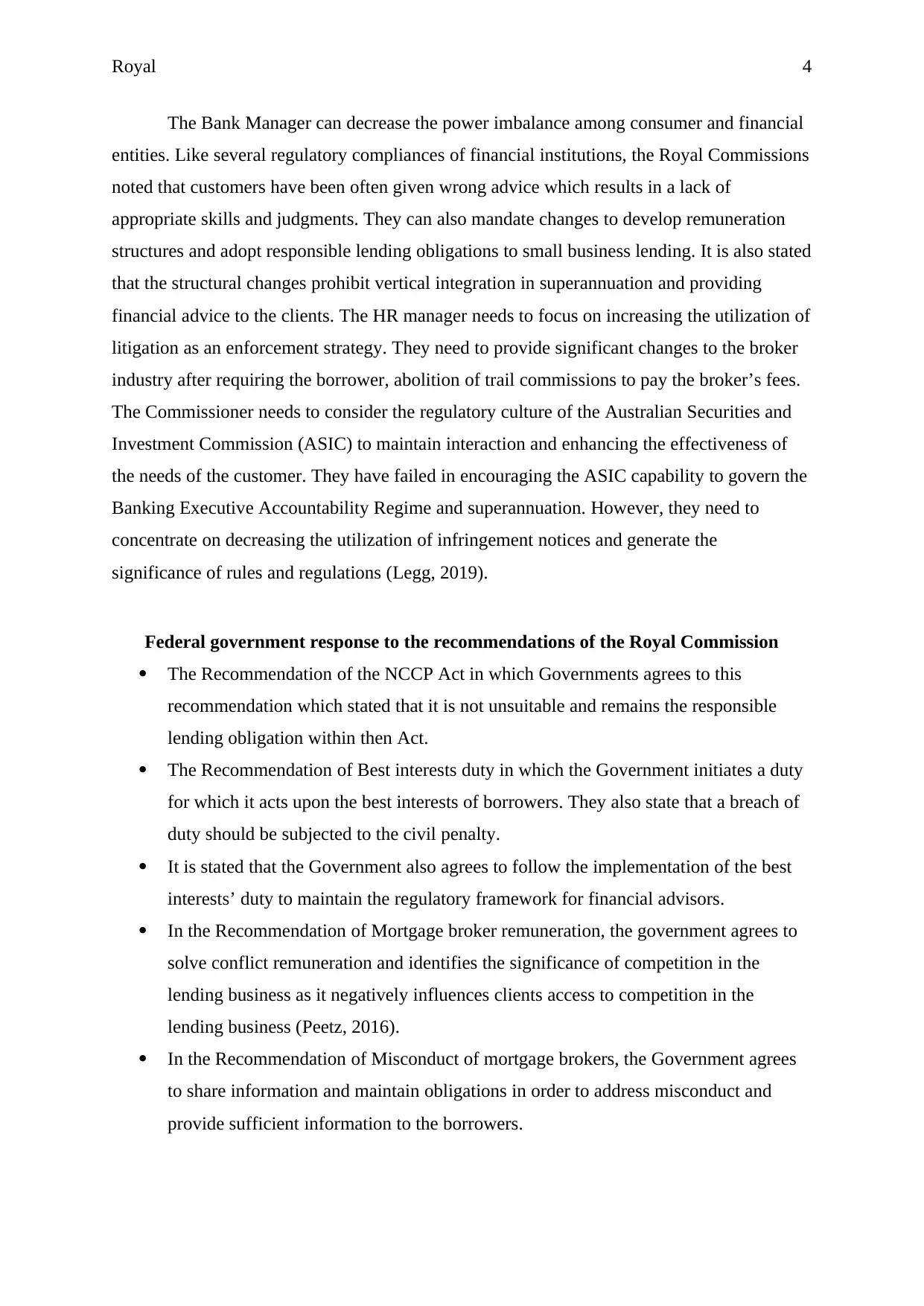
Royal 4
The Bank Manager can decrease the power imbalance among consumer and financial
entities. Like several regulatory compliances of financial institutions, the Royal Commissions
noted that customers have been often given wrong advice which results in a lack of
appropriate skills and judgments. They can also mandate changes to develop remuneration
structures and adopt responsible lending obligations to small business lending. It is also stated
that the structural changes prohibit vertical integration in superannuation and providing
financial advice to the clients. The HR manager needs to focus on increasing the utilization of
litigation as an enforcement strategy. They need to provide significant changes to the broker
industry after requiring the borrower, abolition of trail commissions to pay the broker’s fees.
The Commissioner needs to consider the regulatory culture of the Australian Securities and
Investment Commission (ASIC) to maintain interaction and enhancing the effectiveness of
the needs of the customer. They have failed in encouraging the ASIC capability to govern the
Banking Executive Accountability Regime and superannuation. However, they need to
concentrate on decreasing the utilization of infringement notices and generate the
significance of rules and regulations (Legg, 2019).
Federal government response to the recommendations of the Royal Commission
The Recommendation of the NCCP Act in which Governments agrees to this
recommendation which stated that it is not unsuitable and remains the responsible
lending obligation within then Act.
The Recommendation of Best interests duty in which the Government initiates a duty
for which it acts upon the best interests of borrowers. They also state that a breach of
duty should be subjected to the civil penalty.
It is stated that the Government also agrees to follow the implementation of the best
interests’ duty to maintain the regulatory framework for financial advisors.
In the Recommendation of Mortgage broker remuneration, the government agrees to
solve conflict remuneration and identifies the significance of competition in the
lending business as it negatively influences clients access to competition in the
lending business (Peetz, 2016).
In the Recommendation of Misconduct of mortgage brokers, the Government agrees
to share information and maintain obligations in order to address misconduct and
provide sufficient information to the borrowers.
The Bank Manager can decrease the power imbalance among consumer and financial
entities. Like several regulatory compliances of financial institutions, the Royal Commissions
noted that customers have been often given wrong advice which results in a lack of
appropriate skills and judgments. They can also mandate changes to develop remuneration
structures and adopt responsible lending obligations to small business lending. It is also stated
that the structural changes prohibit vertical integration in superannuation and providing
financial advice to the clients. The HR manager needs to focus on increasing the utilization of
litigation as an enforcement strategy. They need to provide significant changes to the broker
industry after requiring the borrower, abolition of trail commissions to pay the broker’s fees.
The Commissioner needs to consider the regulatory culture of the Australian Securities and
Investment Commission (ASIC) to maintain interaction and enhancing the effectiveness of
the needs of the customer. They have failed in encouraging the ASIC capability to govern the
Banking Executive Accountability Regime and superannuation. However, they need to
concentrate on decreasing the utilization of infringement notices and generate the
significance of rules and regulations (Legg, 2019).
Federal government response to the recommendations of the Royal Commission
The Recommendation of the NCCP Act in which Governments agrees to this
recommendation which stated that it is not unsuitable and remains the responsible
lending obligation within then Act.
The Recommendation of Best interests duty in which the Government initiates a duty
for which it acts upon the best interests of borrowers. They also state that a breach of
duty should be subjected to the civil penalty.
It is stated that the Government also agrees to follow the implementation of the best
interests’ duty to maintain the regulatory framework for financial advisors.
In the Recommendation of Mortgage broker remuneration, the government agrees to
solve conflict remuneration and identifies the significance of competition in the
lending business as it negatively influences clients access to competition in the
lending business (Peetz, 2016).
In the Recommendation of Misconduct of mortgage brokers, the Government agrees
to share information and maintain obligations in order to address misconduct and
provide sufficient information to the borrowers.
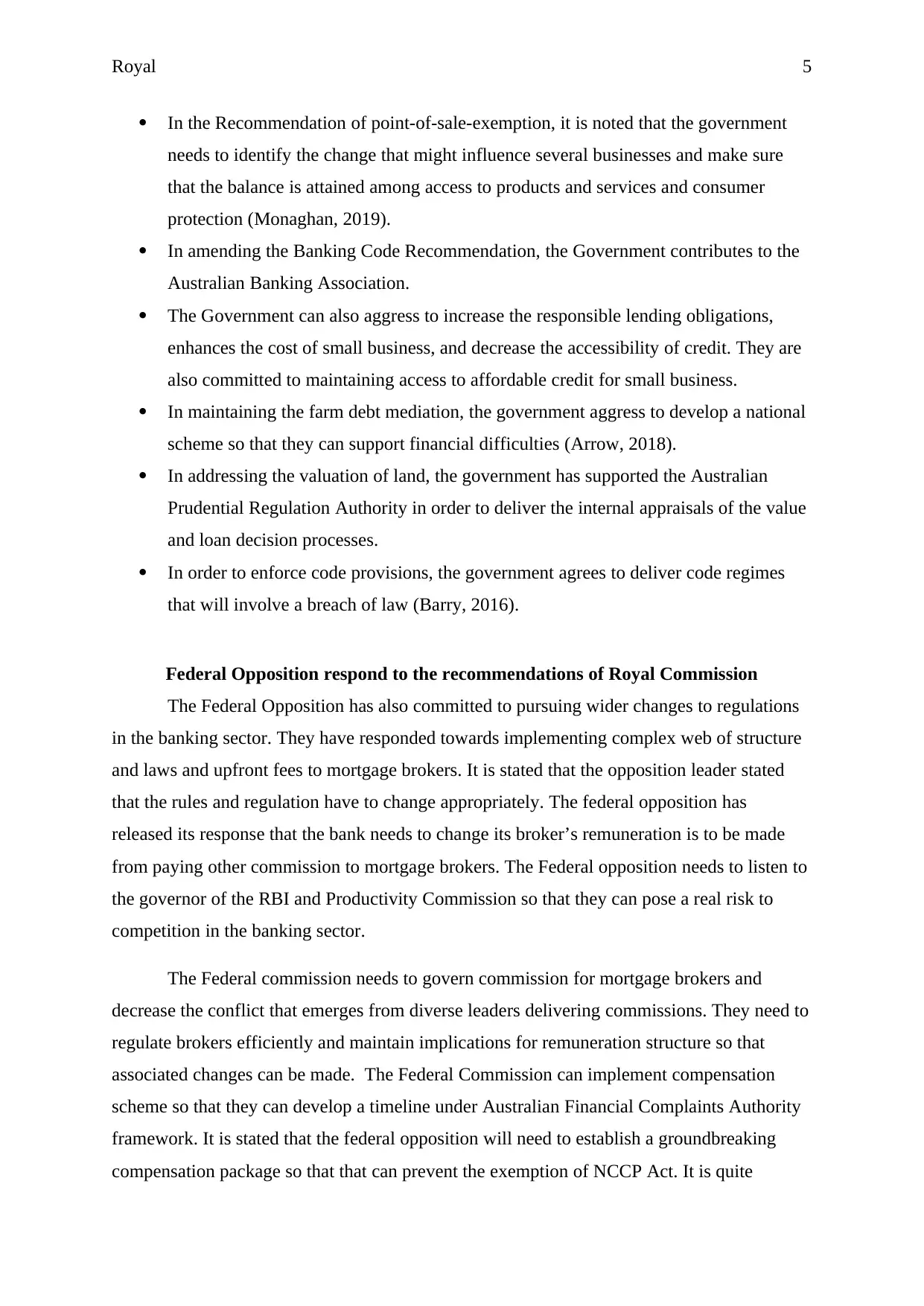
Royal 5
In the Recommendation of point-of-sale-exemption, it is noted that the government
needs to identify the change that might influence several businesses and make sure
that the balance is attained among access to products and services and consumer
protection (Monaghan, 2019).
In amending the Banking Code Recommendation, the Government contributes to the
Australian Banking Association.
The Government can also aggress to increase the responsible lending obligations,
enhances the cost of small business, and decrease the accessibility of credit. They are
also committed to maintaining access to affordable credit for small business.
In maintaining the farm debt mediation, the government aggress to develop a national
scheme so that they can support financial difficulties (Arrow, 2018).
In addressing the valuation of land, the government has supported the Australian
Prudential Regulation Authority in order to deliver the internal appraisals of the value
and loan decision processes.
In order to enforce code provisions, the government agrees to deliver code regimes
that will involve a breach of law (Barry, 2016).
Federal Opposition respond to the recommendations of Royal Commission
The Federal Opposition has also committed to pursuing wider changes to regulations
in the banking sector. They have responded towards implementing complex web of structure
and laws and upfront fees to mortgage brokers. It is stated that the opposition leader stated
that the rules and regulation have to change appropriately. The federal opposition has
released its response that the bank needs to change its broker’s remuneration is to be made
from paying other commission to mortgage brokers. The Federal opposition needs to listen to
the governor of the RBI and Productivity Commission so that they can pose a real risk to
competition in the banking sector.
The Federal commission needs to govern commission for mortgage brokers and
decrease the conflict that emerges from diverse leaders delivering commissions. They need to
regulate brokers efficiently and maintain implications for remuneration structure so that
associated changes can be made. The Federal Commission can implement compensation
scheme so that they can develop a timeline under Australian Financial Complaints Authority
framework. It is stated that the federal opposition will need to establish a groundbreaking
compensation package so that that can prevent the exemption of NCCP Act. It is quite
In the Recommendation of point-of-sale-exemption, it is noted that the government
needs to identify the change that might influence several businesses and make sure
that the balance is attained among access to products and services and consumer
protection (Monaghan, 2019).
In amending the Banking Code Recommendation, the Government contributes to the
Australian Banking Association.
The Government can also aggress to increase the responsible lending obligations,
enhances the cost of small business, and decrease the accessibility of credit. They are
also committed to maintaining access to affordable credit for small business.
In maintaining the farm debt mediation, the government aggress to develop a national
scheme so that they can support financial difficulties (Arrow, 2018).
In addressing the valuation of land, the government has supported the Australian
Prudential Regulation Authority in order to deliver the internal appraisals of the value
and loan decision processes.
In order to enforce code provisions, the government agrees to deliver code regimes
that will involve a breach of law (Barry, 2016).
Federal Opposition respond to the recommendations of Royal Commission
The Federal Opposition has also committed to pursuing wider changes to regulations
in the banking sector. They have responded towards implementing complex web of structure
and laws and upfront fees to mortgage brokers. It is stated that the opposition leader stated
that the rules and regulation have to change appropriately. The federal opposition has
released its response that the bank needs to change its broker’s remuneration is to be made
from paying other commission to mortgage brokers. The Federal opposition needs to listen to
the governor of the RBI and Productivity Commission so that they can pose a real risk to
competition in the banking sector.
The Federal commission needs to govern commission for mortgage brokers and
decrease the conflict that emerges from diverse leaders delivering commissions. They need to
regulate brokers efficiently and maintain implications for remuneration structure so that
associated changes can be made. The Federal Commission can implement compensation
scheme so that they can develop a timeline under Australian Financial Complaints Authority
framework. It is stated that the federal opposition will need to establish a groundbreaking
compensation package so that that can prevent the exemption of NCCP Act. It is quite
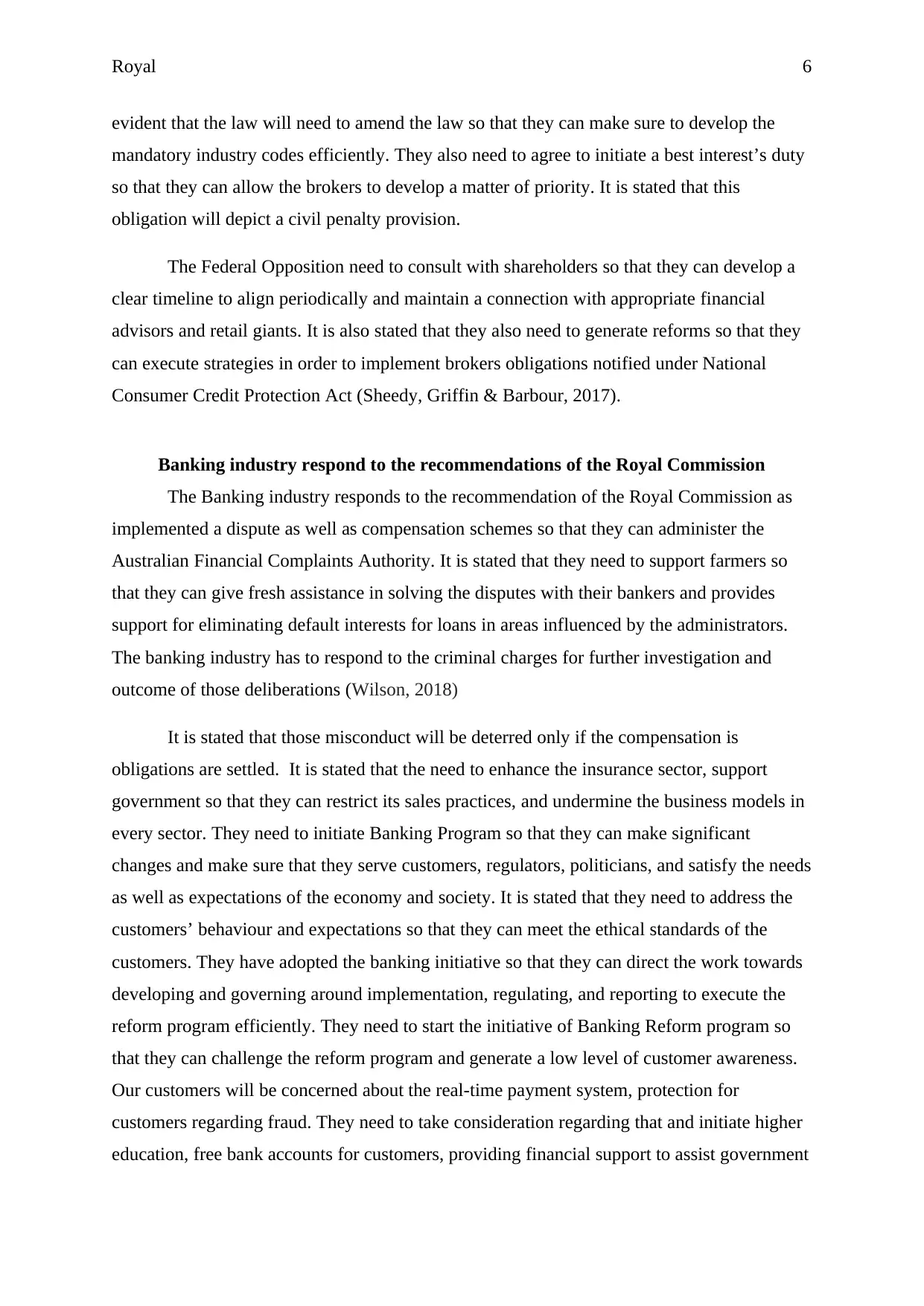
Royal 6
evident that the law will need to amend the law so that they can make sure to develop the
mandatory industry codes efficiently. They also need to agree to initiate a best interest’s duty
so that they can allow the brokers to develop a matter of priority. It is stated that this
obligation will depict a civil penalty provision.
The Federal Opposition need to consult with shareholders so that they can develop a
clear timeline to align periodically and maintain a connection with appropriate financial
advisors and retail giants. It is also stated that they also need to generate reforms so that they
can execute strategies in order to implement brokers obligations notified under National
Consumer Credit Protection Act (Sheedy, Griffin & Barbour, 2017).
Banking industry respond to the recommendations of the Royal Commission
The Banking industry responds to the recommendation of the Royal Commission as
implemented a dispute as well as compensation schemes so that they can administer the
Australian Financial Complaints Authority. It is stated that they need to support farmers so
that they can give fresh assistance in solving the disputes with their bankers and provides
support for eliminating default interests for loans in areas influenced by the administrators.
The banking industry has to respond to the criminal charges for further investigation and
outcome of those deliberations (Wilson, 2018)
It is stated that those misconduct will be deterred only if the compensation is
obligations are settled. It is stated that the need to enhance the insurance sector, support
government so that they can restrict its sales practices, and undermine the business models in
every sector. They need to initiate Banking Program so that they can make significant
changes and make sure that they serve customers, regulators, politicians, and satisfy the needs
as well as expectations of the economy and society. It is stated that they need to address the
customers’ behaviour and expectations so that they can meet the ethical standards of the
customers. They have adopted the banking initiative so that they can direct the work towards
developing and governing around implementation, regulating, and reporting to execute the
reform program efficiently. They need to start the initiative of Banking Reform program so
that they can challenge the reform program and generate a low level of customer awareness.
Our customers will be concerned about the real-time payment system, protection for
customers regarding fraud. They need to take consideration regarding that and initiate higher
education, free bank accounts for customers, providing financial support to assist government
evident that the law will need to amend the law so that they can make sure to develop the
mandatory industry codes efficiently. They also need to agree to initiate a best interest’s duty
so that they can allow the brokers to develop a matter of priority. It is stated that this
obligation will depict a civil penalty provision.
The Federal Opposition need to consult with shareholders so that they can develop a
clear timeline to align periodically and maintain a connection with appropriate financial
advisors and retail giants. It is also stated that they also need to generate reforms so that they
can execute strategies in order to implement brokers obligations notified under National
Consumer Credit Protection Act (Sheedy, Griffin & Barbour, 2017).
Banking industry respond to the recommendations of the Royal Commission
The Banking industry responds to the recommendation of the Royal Commission as
implemented a dispute as well as compensation schemes so that they can administer the
Australian Financial Complaints Authority. It is stated that they need to support farmers so
that they can give fresh assistance in solving the disputes with their bankers and provides
support for eliminating default interests for loans in areas influenced by the administrators.
The banking industry has to respond to the criminal charges for further investigation and
outcome of those deliberations (Wilson, 2018)
It is stated that those misconduct will be deterred only if the compensation is
obligations are settled. It is stated that the need to enhance the insurance sector, support
government so that they can restrict its sales practices, and undermine the business models in
every sector. They need to initiate Banking Program so that they can make significant
changes and make sure that they serve customers, regulators, politicians, and satisfy the needs
as well as expectations of the economy and society. It is stated that they need to address the
customers’ behaviour and expectations so that they can meet the ethical standards of the
customers. They have adopted the banking initiative so that they can direct the work towards
developing and governing around implementation, regulating, and reporting to execute the
reform program efficiently. They need to start the initiative of Banking Reform program so
that they can challenge the reform program and generate a low level of customer awareness.
Our customers will be concerned about the real-time payment system, protection for
customers regarding fraud. They need to take consideration regarding that and initiate higher
education, free bank accounts for customers, providing financial support to assist government
Paraphrase This Document
Need a fresh take? Get an instant paraphrase of this document with our AI Paraphraser
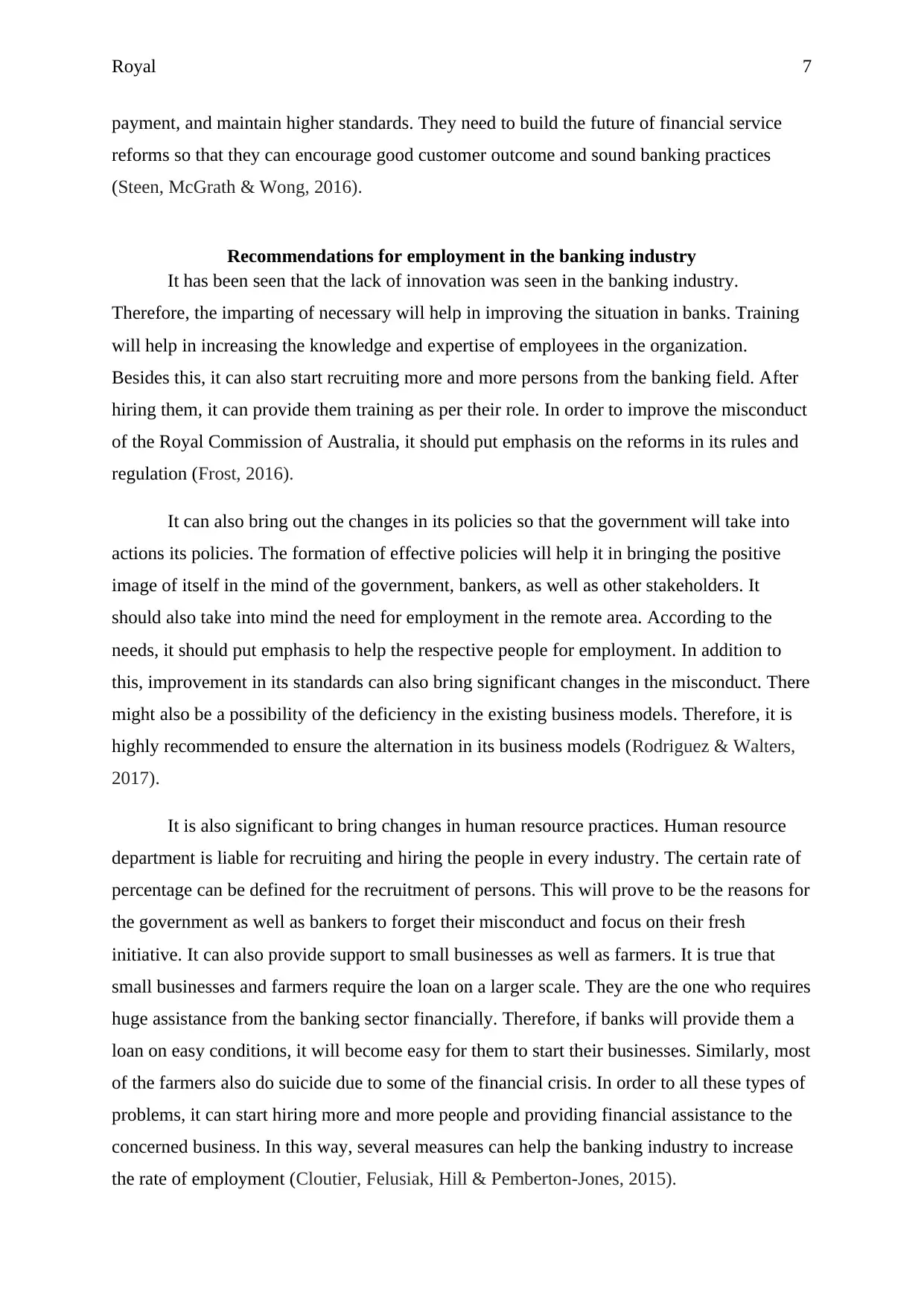
Royal 7
payment, and maintain higher standards. They need to build the future of financial service
reforms so that they can encourage good customer outcome and sound banking practices
(Steen, McGrath & Wong, 2016).
Recommendations for employment in the banking industry
It has been seen that the lack of innovation was seen in the banking industry.
Therefore, the imparting of necessary will help in improving the situation in banks. Training
will help in increasing the knowledge and expertise of employees in the organization.
Besides this, it can also start recruiting more and more persons from the banking field. After
hiring them, it can provide them training as per their role. In order to improve the misconduct
of the Royal Commission of Australia, it should put emphasis on the reforms in its rules and
regulation (Frost, 2016).
It can also bring out the changes in its policies so that the government will take into
actions its policies. The formation of effective policies will help it in bringing the positive
image of itself in the mind of the government, bankers, as well as other stakeholders. It
should also take into mind the need for employment in the remote area. According to the
needs, it should put emphasis to help the respective people for employment. In addition to
this, improvement in its standards can also bring significant changes in the misconduct. There
might also be a possibility of the deficiency in the existing business models. Therefore, it is
highly recommended to ensure the alternation in its business models (Rodriguez & Walters,
2017).
It is also significant to bring changes in human resource practices. Human resource
department is liable for recruiting and hiring the people in every industry. The certain rate of
percentage can be defined for the recruitment of persons. This will prove to be the reasons for
the government as well as bankers to forget their misconduct and focus on their fresh
initiative. It can also provide support to small businesses as well as farmers. It is true that
small businesses and farmers require the loan on a larger scale. They are the one who requires
huge assistance from the banking sector financially. Therefore, if banks will provide them a
loan on easy conditions, it will become easy for them to start their businesses. Similarly, most
of the farmers also do suicide due to some of the financial crisis. In order to all these types of
problems, it can start hiring more and more people and providing financial assistance to the
concerned business. In this way, several measures can help the banking industry to increase
the rate of employment (Cloutier, Felusiak, Hill & Pemberton-Jones, 2015).
payment, and maintain higher standards. They need to build the future of financial service
reforms so that they can encourage good customer outcome and sound banking practices
(Steen, McGrath & Wong, 2016).
Recommendations for employment in the banking industry
It has been seen that the lack of innovation was seen in the banking industry.
Therefore, the imparting of necessary will help in improving the situation in banks. Training
will help in increasing the knowledge and expertise of employees in the organization.
Besides this, it can also start recruiting more and more persons from the banking field. After
hiring them, it can provide them training as per their role. In order to improve the misconduct
of the Royal Commission of Australia, it should put emphasis on the reforms in its rules and
regulation (Frost, 2016).
It can also bring out the changes in its policies so that the government will take into
actions its policies. The formation of effective policies will help it in bringing the positive
image of itself in the mind of the government, bankers, as well as other stakeholders. It
should also take into mind the need for employment in the remote area. According to the
needs, it should put emphasis to help the respective people for employment. In addition to
this, improvement in its standards can also bring significant changes in the misconduct. There
might also be a possibility of the deficiency in the existing business models. Therefore, it is
highly recommended to ensure the alternation in its business models (Rodriguez & Walters,
2017).
It is also significant to bring changes in human resource practices. Human resource
department is liable for recruiting and hiring the people in every industry. The certain rate of
percentage can be defined for the recruitment of persons. This will prove to be the reasons for
the government as well as bankers to forget their misconduct and focus on their fresh
initiative. It can also provide support to small businesses as well as farmers. It is true that
small businesses and farmers require the loan on a larger scale. They are the one who requires
huge assistance from the banking sector financially. Therefore, if banks will provide them a
loan on easy conditions, it will become easy for them to start their businesses. Similarly, most
of the farmers also do suicide due to some of the financial crisis. In order to all these types of
problems, it can start hiring more and more people and providing financial assistance to the
concerned business. In this way, several measures can help the banking industry to increase
the rate of employment (Cloutier, Felusiak, Hill & Pemberton-Jones, 2015).
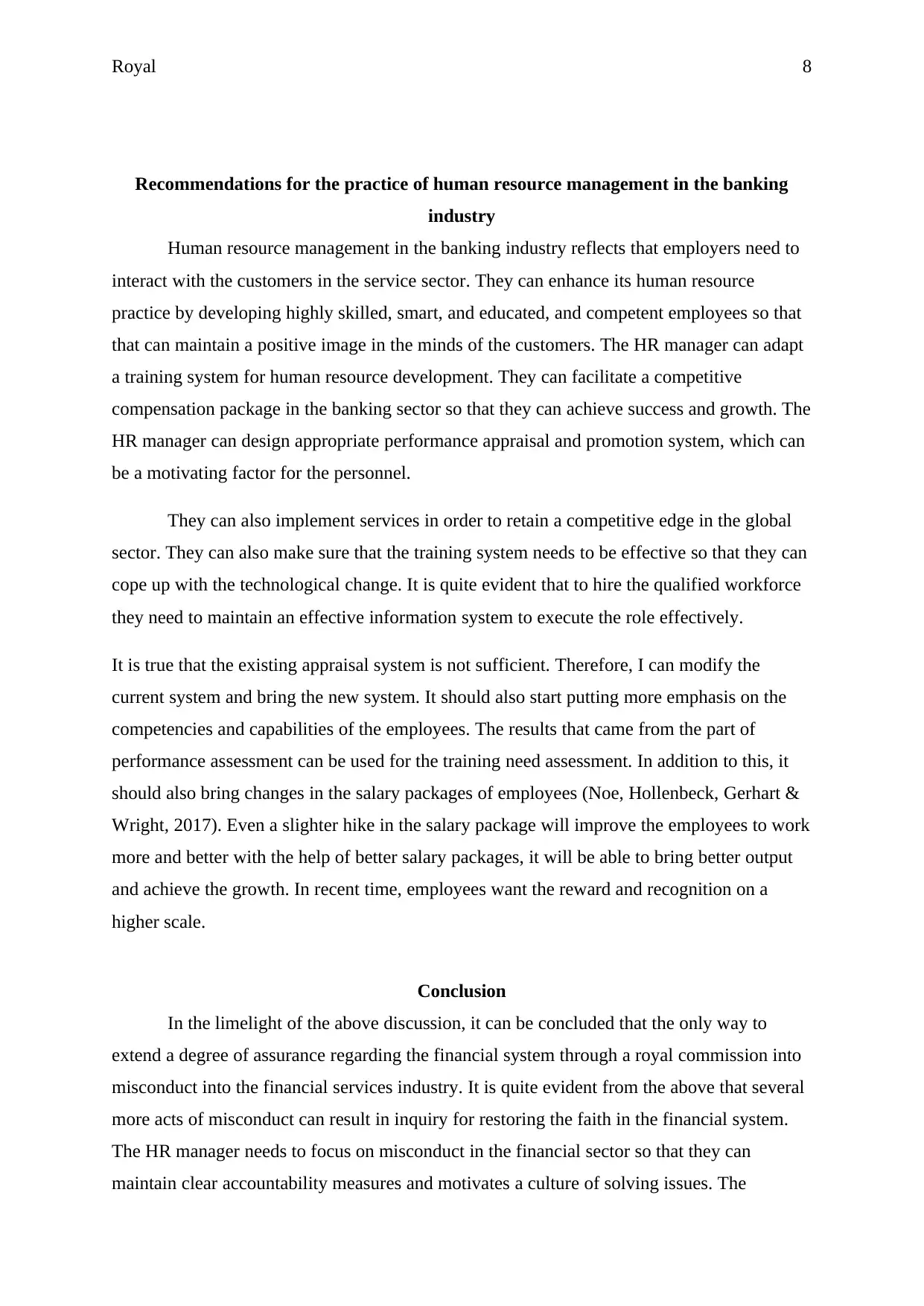
Royal 8
Recommendations for the practice of human resource management in the banking
industry
Human resource management in the banking industry reflects that employers need to
interact with the customers in the service sector. They can enhance its human resource
practice by developing highly skilled, smart, and educated, and competent employees so that
that can maintain a positive image in the minds of the customers. The HR manager can adapt
a training system for human resource development. They can facilitate a competitive
compensation package in the banking sector so that they can achieve success and growth. The
HR manager can design appropriate performance appraisal and promotion system, which can
be a motivating factor for the personnel.
They can also implement services in order to retain a competitive edge in the global
sector. They can also make sure that the training system needs to be effective so that they can
cope up with the technological change. It is quite evident that to hire the qualified workforce
they need to maintain an effective information system to execute the role effectively.
It is true that the existing appraisal system is not sufficient. Therefore, I can modify the
current system and bring the new system. It should also start putting more emphasis on the
competencies and capabilities of the employees. The results that came from the part of
performance assessment can be used for the training need assessment. In addition to this, it
should also bring changes in the salary packages of employees (Noe, Hollenbeck, Gerhart &
Wright, 2017). Even a slighter hike in the salary package will improve the employees to work
more and better with the help of better salary packages, it will be able to bring better output
and achieve the growth. In recent time, employees want the reward and recognition on a
higher scale.
Conclusion
In the limelight of the above discussion, it can be concluded that the only way to
extend a degree of assurance regarding the financial system through a royal commission into
misconduct into the financial services industry. It is quite evident from the above that several
more acts of misconduct can result in inquiry for restoring the faith in the financial system.
The HR manager needs to focus on misconduct in the financial sector so that they can
maintain clear accountability measures and motivates a culture of solving issues. The
Recommendations for the practice of human resource management in the banking
industry
Human resource management in the banking industry reflects that employers need to
interact with the customers in the service sector. They can enhance its human resource
practice by developing highly skilled, smart, and educated, and competent employees so that
that can maintain a positive image in the minds of the customers. The HR manager can adapt
a training system for human resource development. They can facilitate a competitive
compensation package in the banking sector so that they can achieve success and growth. The
HR manager can design appropriate performance appraisal and promotion system, which can
be a motivating factor for the personnel.
They can also implement services in order to retain a competitive edge in the global
sector. They can also make sure that the training system needs to be effective so that they can
cope up with the technological change. It is quite evident that to hire the qualified workforce
they need to maintain an effective information system to execute the role effectively.
It is true that the existing appraisal system is not sufficient. Therefore, I can modify the
current system and bring the new system. It should also start putting more emphasis on the
competencies and capabilities of the employees. The results that came from the part of
performance assessment can be used for the training need assessment. In addition to this, it
should also bring changes in the salary packages of employees (Noe, Hollenbeck, Gerhart &
Wright, 2017). Even a slighter hike in the salary package will improve the employees to work
more and better with the help of better salary packages, it will be able to bring better output
and achieve the growth. In recent time, employees want the reward and recognition on a
higher scale.
Conclusion
In the limelight of the above discussion, it can be concluded that the only way to
extend a degree of assurance regarding the financial system through a royal commission into
misconduct into the financial services industry. It is quite evident from the above that several
more acts of misconduct can result in inquiry for restoring the faith in the financial system.
The HR manager needs to focus on misconduct in the financial sector so that they can
maintain clear accountability measures and motivates a culture of solving issues. The

Royal 9
recommendations are been made to mandate structures and take pro-active steps to solve the
misconduct effectively.
recommendations are been made to mandate structures and take pro-active steps to solve the
misconduct effectively.
Secure Best Marks with AI Grader
Need help grading? Try our AI Grader for instant feedback on your assignments.
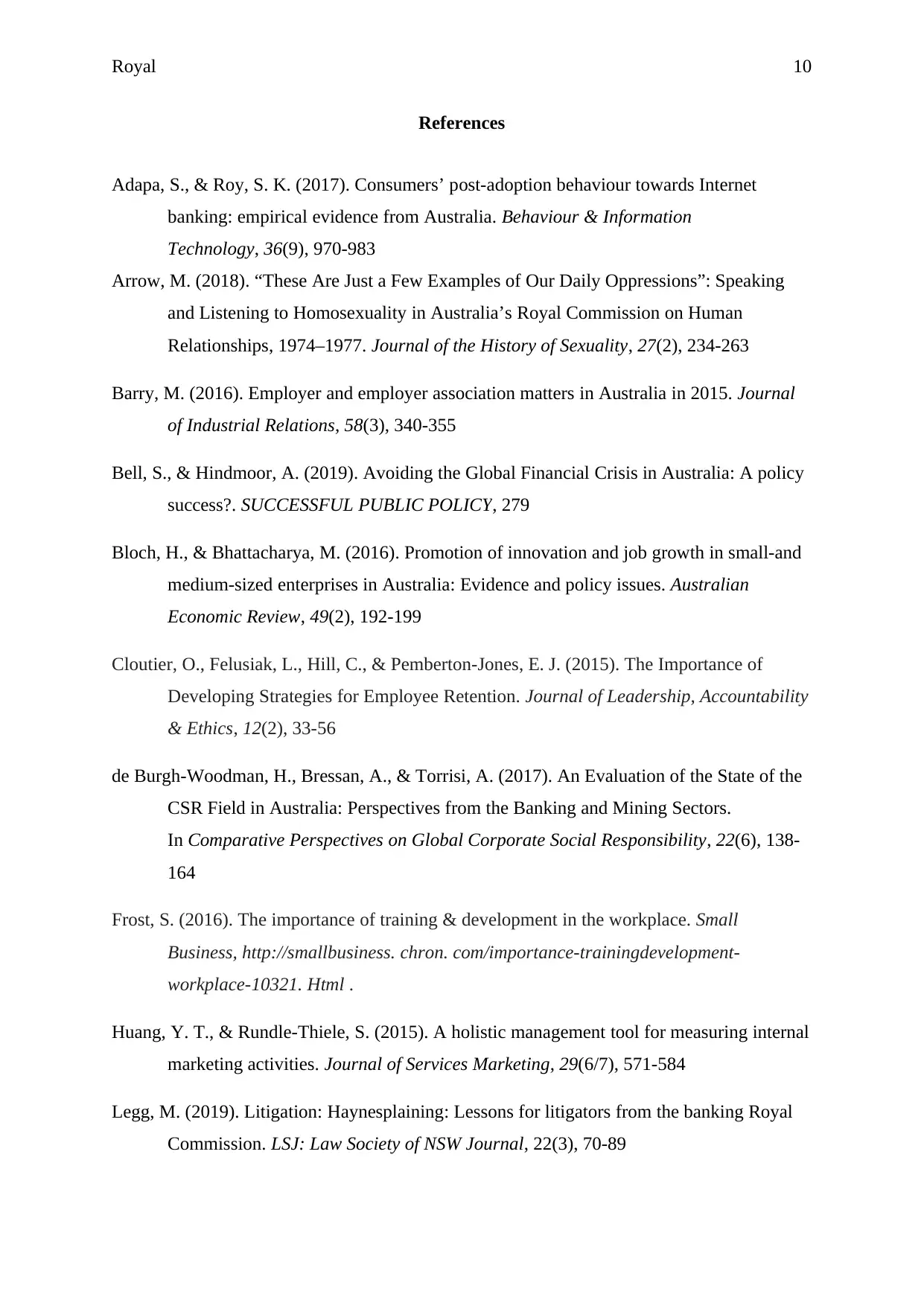
Royal 10
References
Adapa, S., & Roy, S. K. (2017). Consumers’ post-adoption behaviour towards Internet
banking: empirical evidence from Australia. Behaviour & Information
Technology, 36(9), 970-983
Arrow, M. (2018). “These Are Just a Few Examples of Our Daily Oppressions”: Speaking
and Listening to Homosexuality in Australia’s Royal Commission on Human
Relationships, 1974–1977. Journal of the History of Sexuality, 27(2), 234-263
Barry, M. (2016). Employer and employer association matters in Australia in 2015. Journal
of Industrial Relations, 58(3), 340-355
Bell, S., & Hindmoor, A. (2019). Avoiding the Global Financial Crisis in Australia: A policy
success?. SUCCESSFUL PUBLIC POLICY, 279
Bloch, H., & Bhattacharya, M. (2016). Promotion of innovation and job growth in small‐and
medium‐sized enterprises in Australia: Evidence and policy issues. Australian
Economic Review, 49(2), 192-199
Cloutier, O., Felusiak, L., Hill, C., & Pemberton-Jones, E. J. (2015). The Importance of
Developing Strategies for Employee Retention. Journal of Leadership, Accountability
& Ethics, 12(2), 33-56
de Burgh-Woodman, H., Bressan, A., & Torrisi, A. (2017). An Evaluation of the State of the
CSR Field in Australia: Perspectives from the Banking and Mining Sectors.
In Comparative Perspectives on Global Corporate Social Responsibility, 22(6), 138-
164
Frost, S. (2016). The importance of training & development in the workplace. Small
Business, http://smallbusiness. chron. com/importance-trainingdevelopment-
workplace-10321. Html .
Huang, Y. T., & Rundle-Thiele, S. (2015). A holistic management tool for measuring internal
marketing activities. Journal of Services Marketing, 29(6/7), 571-584
Legg, M. (2019). Litigation: Haynesplaining: Lessons for litigators from the banking Royal
Commission. LSJ: Law Society of NSW Journal, 22(3), 70-89
References
Adapa, S., & Roy, S. K. (2017). Consumers’ post-adoption behaviour towards Internet
banking: empirical evidence from Australia. Behaviour & Information
Technology, 36(9), 970-983
Arrow, M. (2018). “These Are Just a Few Examples of Our Daily Oppressions”: Speaking
and Listening to Homosexuality in Australia’s Royal Commission on Human
Relationships, 1974–1977. Journal of the History of Sexuality, 27(2), 234-263
Barry, M. (2016). Employer and employer association matters in Australia in 2015. Journal
of Industrial Relations, 58(3), 340-355
Bell, S., & Hindmoor, A. (2019). Avoiding the Global Financial Crisis in Australia: A policy
success?. SUCCESSFUL PUBLIC POLICY, 279
Bloch, H., & Bhattacharya, M. (2016). Promotion of innovation and job growth in small‐and
medium‐sized enterprises in Australia: Evidence and policy issues. Australian
Economic Review, 49(2), 192-199
Cloutier, O., Felusiak, L., Hill, C., & Pemberton-Jones, E. J. (2015). The Importance of
Developing Strategies for Employee Retention. Journal of Leadership, Accountability
& Ethics, 12(2), 33-56
de Burgh-Woodman, H., Bressan, A., & Torrisi, A. (2017). An Evaluation of the State of the
CSR Field in Australia: Perspectives from the Banking and Mining Sectors.
In Comparative Perspectives on Global Corporate Social Responsibility, 22(6), 138-
164
Frost, S. (2016). The importance of training & development in the workplace. Small
Business, http://smallbusiness. chron. com/importance-trainingdevelopment-
workplace-10321. Html .
Huang, Y. T., & Rundle-Thiele, S. (2015). A holistic management tool for measuring internal
marketing activities. Journal of Services Marketing, 29(6/7), 571-584
Legg, M. (2019). Litigation: Haynesplaining: Lessons for litigators from the banking Royal
Commission. LSJ: Law Society of NSW Journal, 22(3), 70-89
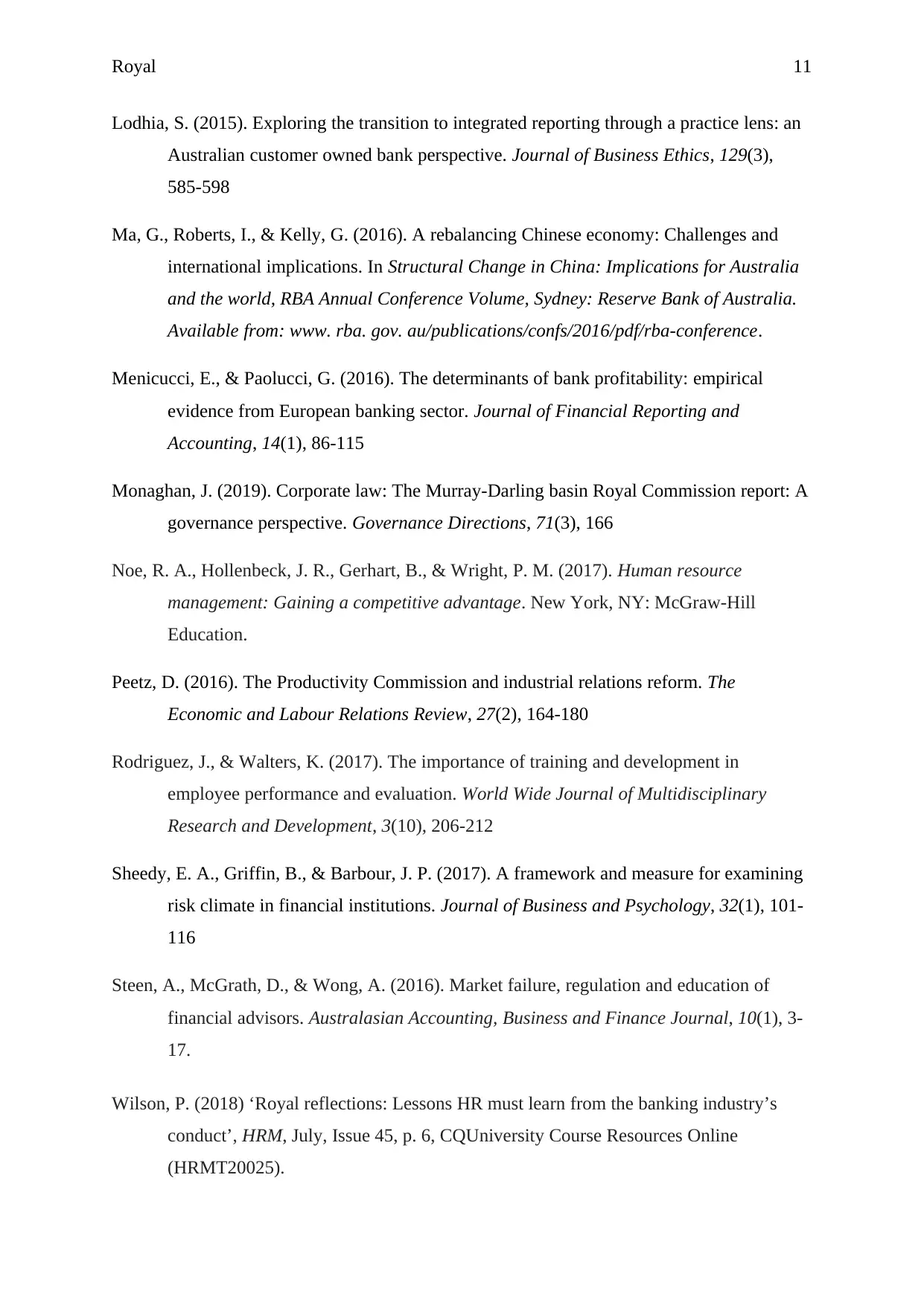
Royal 11
Lodhia, S. (2015). Exploring the transition to integrated reporting through a practice lens: an
Australian customer owned bank perspective. Journal of Business Ethics, 129(3),
585-598
Ma, G., Roberts, I., & Kelly, G. (2016). A rebalancing Chinese economy: Challenges and
international implications. In Structural Change in China: Implications for Australia
and the world, RBA Annual Conference Volume, Sydney: Reserve Bank of Australia.
Available from: www. rba. gov. au/publications/confs/2016/pdf/rba-conference.
Menicucci, E., & Paolucci, G. (2016). The determinants of bank profitability: empirical
evidence from European banking sector. Journal of Financial Reporting and
Accounting, 14(1), 86-115
Monaghan, J. (2019). Corporate law: The Murray-Darling basin Royal Commission report: A
governance perspective. Governance Directions, 71(3), 166
Noe, R. A., Hollenbeck, J. R., Gerhart, B., & Wright, P. M. (2017). Human resource
management: Gaining a competitive advantage. New York, NY: McGraw-Hill
Education.
Peetz, D. (2016). The Productivity Commission and industrial relations reform. The
Economic and Labour Relations Review, 27(2), 164-180
Rodriguez, J., & Walters, K. (2017). The importance of training and development in
employee performance and evaluation. World Wide Journal of Multidisciplinary
Research and Development, 3(10), 206-212
Sheedy, E. A., Griffin, B., & Barbour, J. P. (2017). A framework and measure for examining
risk climate in financial institutions. Journal of Business and Psychology, 32(1), 101-
116
Steen, A., McGrath, D., & Wong, A. (2016). Market failure, regulation and education of
financial advisors. Australasian Accounting, Business and Finance Journal, 10(1), 3-
17.
Wilson, P. (2018) ‘Royal reflections: Lessons HR must learn from the banking industry’s
conduct’, HRM, July, Issue 45, p. 6, CQUniversity Course Resources Online
(HRMT20025).
Lodhia, S. (2015). Exploring the transition to integrated reporting through a practice lens: an
Australian customer owned bank perspective. Journal of Business Ethics, 129(3),
585-598
Ma, G., Roberts, I., & Kelly, G. (2016). A rebalancing Chinese economy: Challenges and
international implications. In Structural Change in China: Implications for Australia
and the world, RBA Annual Conference Volume, Sydney: Reserve Bank of Australia.
Available from: www. rba. gov. au/publications/confs/2016/pdf/rba-conference.
Menicucci, E., & Paolucci, G. (2016). The determinants of bank profitability: empirical
evidence from European banking sector. Journal of Financial Reporting and
Accounting, 14(1), 86-115
Monaghan, J. (2019). Corporate law: The Murray-Darling basin Royal Commission report: A
governance perspective. Governance Directions, 71(3), 166
Noe, R. A., Hollenbeck, J. R., Gerhart, B., & Wright, P. M. (2017). Human resource
management: Gaining a competitive advantage. New York, NY: McGraw-Hill
Education.
Peetz, D. (2016). The Productivity Commission and industrial relations reform. The
Economic and Labour Relations Review, 27(2), 164-180
Rodriguez, J., & Walters, K. (2017). The importance of training and development in
employee performance and evaluation. World Wide Journal of Multidisciplinary
Research and Development, 3(10), 206-212
Sheedy, E. A., Griffin, B., & Barbour, J. P. (2017). A framework and measure for examining
risk climate in financial institutions. Journal of Business and Psychology, 32(1), 101-
116
Steen, A., McGrath, D., & Wong, A. (2016). Market failure, regulation and education of
financial advisors. Australasian Accounting, Business and Finance Journal, 10(1), 3-
17.
Wilson, P. (2018) ‘Royal reflections: Lessons HR must learn from the banking industry’s
conduct’, HRM, July, Issue 45, p. 6, CQUniversity Course Resources Online
(HRMT20025).
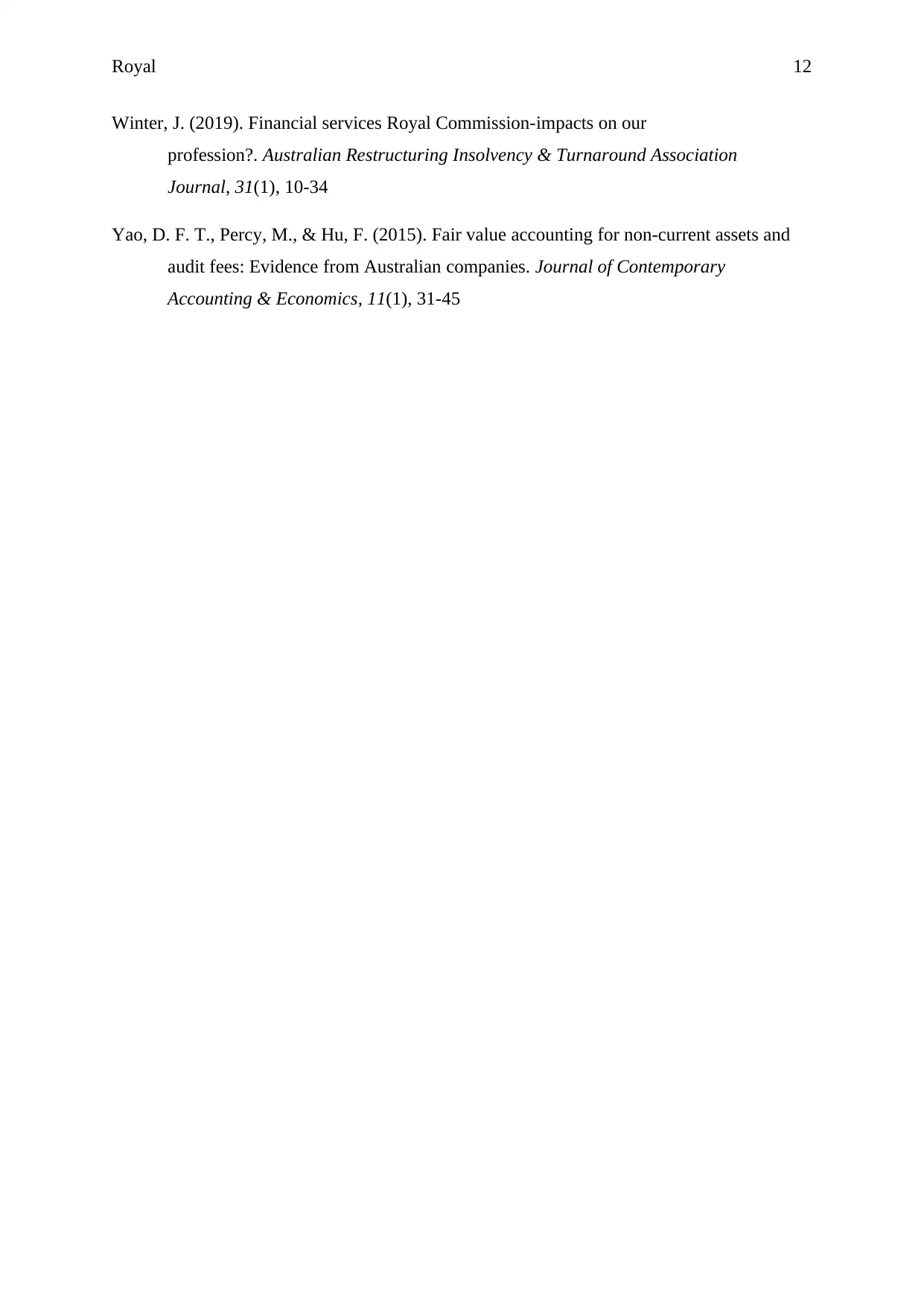
Royal 12
Winter, J. (2019). Financial services Royal Commission-impacts on our
profession?. Australian Restructuring Insolvency & Turnaround Association
Journal, 31(1), 10-34
Yao, D. F. T., Percy, M., & Hu, F. (2015). Fair value accounting for non-current assets and
audit fees: Evidence from Australian companies. Journal of Contemporary
Accounting & Economics, 11(1), 31-45
Winter, J. (2019). Financial services Royal Commission-impacts on our
profession?. Australian Restructuring Insolvency & Turnaround Association
Journal, 31(1), 10-34
Yao, D. F. T., Percy, M., & Hu, F. (2015). Fair value accounting for non-current assets and
audit fees: Evidence from Australian companies. Journal of Contemporary
Accounting & Economics, 11(1), 31-45
1 out of 13
Related Documents
Your All-in-One AI-Powered Toolkit for Academic Success.
+13062052269
info@desklib.com
Available 24*7 on WhatsApp / Email
![[object Object]](/_next/static/media/star-bottom.7253800d.svg)
Unlock your academic potential
© 2024 | Zucol Services PVT LTD | All rights reserved.





